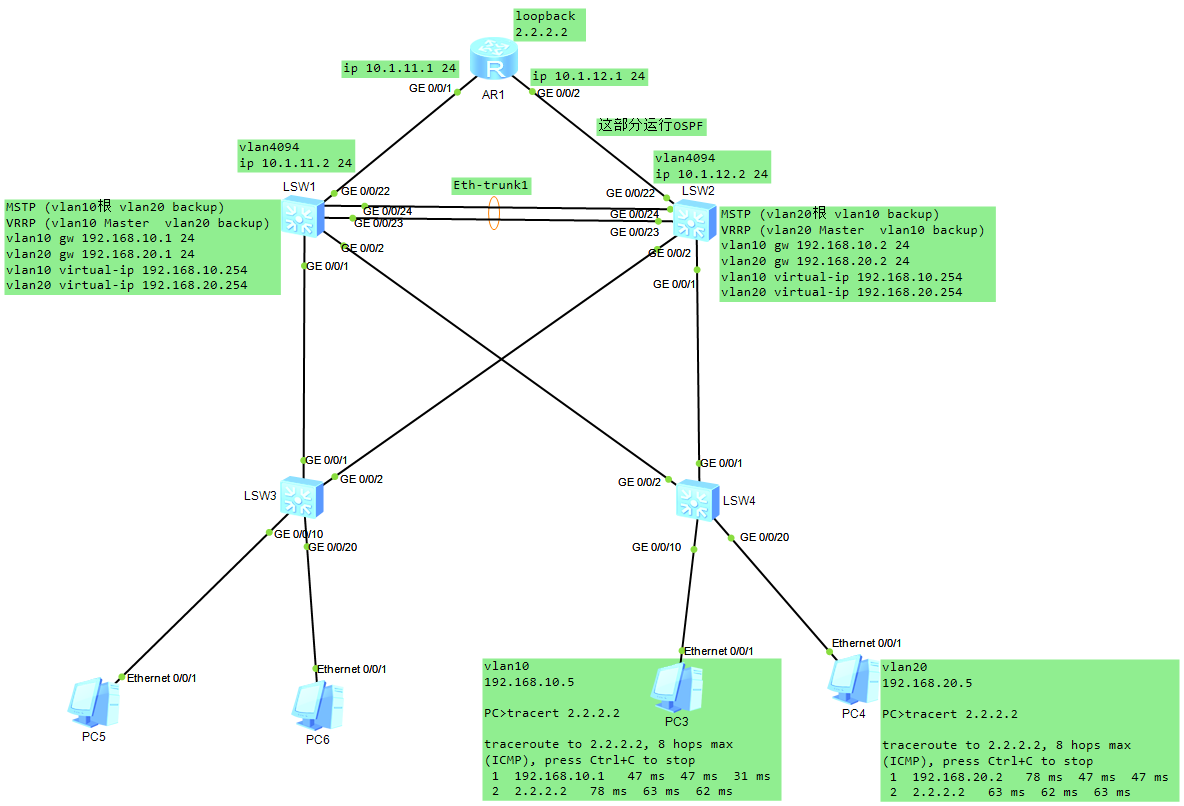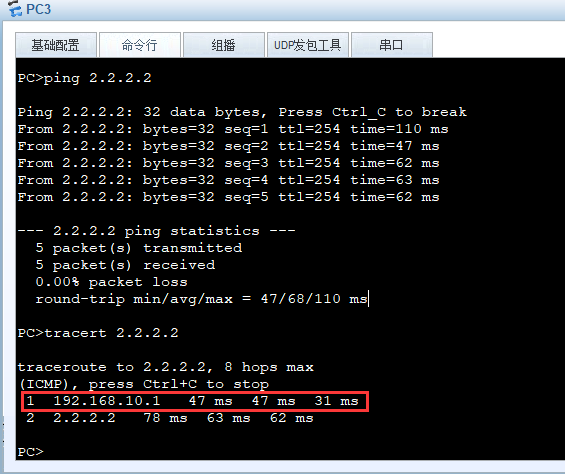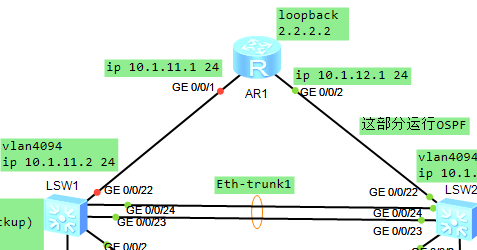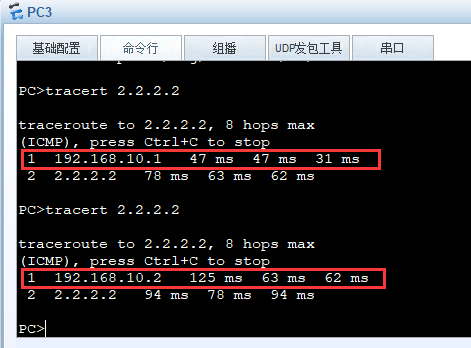VRRP+MSTP配置
VRRP+MSTP(多实例生成树+双路由冗余) 实现负载分担
MSTP (多生成树) 每个VLAN或者几个VLAN拥有一颗生成树,基于实例的生成树。instance 1、instance 2 每个实例拥有一颗生成树。MSTP可以实现多VLAN 的负载分担,可以实现多厂商对接。
VRRP虚拟路由冗余协议(Virtual Router Redundancy Protocol)是由IETF提出的解决局域网中配置静态网关出现单点失效现象的路由协议。
拓扑如下:

交换机与交换机之间的链路为trunk类型,放行vlan10 20
SW1配置:
[sw1]vlan batch 10 20 #创建vlan10 20 [sw1-Vlanif10]dis this # interface Vlanif10 ip address 192.168.10.1 255.255.255.0 #配置物理网关地址 vrrp vrid 1 virtual-ip 192.168.10.254 #配置vrrp组1 配置虚拟网关地址 vrrp vrid 1 priority 120 #配置优先级为120,默认100数字越大越优先,使它成为vlan10的Master
vrrp vrid 1 preempt-mode timer delay 20 #延迟20秒后抢占 vrrp vrid 1 track interface GigabitEthernet0/0/3 reduced 30 #检测上联端口,如果断开优先级降低30(之后会作为backup) # [sw1-Vlanif20]dis this # interface Vlanif20 ip address 192.168.20.1 255.255.255.0 #配置vlan20的物理网关 vrrp vrid 2 virtual-ip 192.168.20.254 #配置vlan20的虚拟网关 MSTP配置 [sw1]stp mode mstp #配置stp模式为mstp [sw1]stp region-configuration #进入stp配置模式 [sw1-mst-region]dis this # stp region-configuration region-name HW #配置域名为HW revision-level 1 #配置版本等级为1(可选) instance 10 vlan 10 #配置vlan10 加入实例10 instance 20 vlan 20 #配置vlan20 加入实例20 active region-configuration # [sw1]stp instance 10 root primary #配置实例10为根 [sw1]stp instance 20 root secondary #配置实例20为备份根
SW2配置:
[sw2]vlan batch 10 20 [sw2-Vlanif10]dis this # interface Vlanif10 ip address 192.168.10.2 255.255.255.0 #配置vlan10网关 vrrp vrid 1 virtual-ip 192.168.10.254 #配置vrrp组1 配置虚拟网关和SW1一样 # [sw2-Vlanif20]dis this # interface Vlanif20 ip address 192.168.20.2 255.255.255.0 #配置vlan20网关 vrrp vrid 2 virtual-ip 192.168.20.254 #配置vrrp组2 配置虚拟网关和SW1一样 vrrp vrid 2 priority 120 #配置优先级为120,使vrrp2 成为vlan20的Master
vrrp vrid 2 preempt-mode timer delay 20 #延迟20s后抢占 vrrp vrid 2 track interface GigabitEthernet0/0/22 reduced 30 #配置上联链路检测,如果断开优先级减去30 使它成为backup # MSTP配置 [sw2]stp mode mstp #配置stp模式为mstp [sw2]stp region-configuration #进入stp配置模式 [sw2-mst-region]dis this # stp region-configuration region-name HW #配置域名为HW revision-level 1 #配置版本等级为1(可选) instance 10 vlan 10 #配置vlan10 加入实例10 instance 20 vlan 20 #配置vlan20 加入实例20 active region-configuration # [sw2]stp instance 20 root primary #配置实例20为根 [sw2]stp instance 10 root secondary #配置实例10为备份根
SW3配置:
[sw3]vlan batch 10 20 MSTP配置 [sw3]stp mode mstp #配置stp模式为mstp [sw3]stp region-configuration #进入stp配置模式 [sw3-mst-region]dis this # stp region-configuration region-name HW #配置域名为HW revision-level 1 #配置版本等级为1(可选) instance 10 vlan 10 #配置vlan10 加入实例10 instance 20 vlan 20 #配置vlan20 加入实例20 active region-configuration #
SW4配置:
[sw4]vlan batch 10 20 MSTP配置 [sw4]stp mode mstp #配置stp模式为mstp [sw4]stp region-configuration #进入stp配置模式 [sw4-mst-region]dis this # stp region-configuration region-name HW #配置域名为HW revision-level 1 #配置版本等级为1(可选) instance 10 vlan 10 #配置vlan10 加入实例10 instance 20 vlan 20 #配置vlan20 加入实例20 active region-configuration #
测试效果:
可以看出来PC3走的是 sw1的网关

PC4走的是SW2的网关

假设SW1的上联链路断开:

SW2接管了vlan10成为了Master
<sw2>dis vrrp Vlanif10 | Virtual Router 10 State : Master #sw2变成了vlan10的Master Virtual IP : 192.168.10.254 Master IP : 192.168.10.2 PriorityRun : 100 PriorityConfig : 100 MasterPriority : 100 Preempt : YES Delay Time : 0 s TimerRun : 1 s TimerConfig : 1 s Auth type : NONE Virtual MAC : 0000-5e00-010a Check TTL : YES Config type : normal-vrrp Create time : 2021-09-07 20:41:05 UTC-08:00 Last change time : 2021-09-08 10:39:48 UTC-08:00
可以看出来PC3的数据从SW1切换到了SW2上

End



